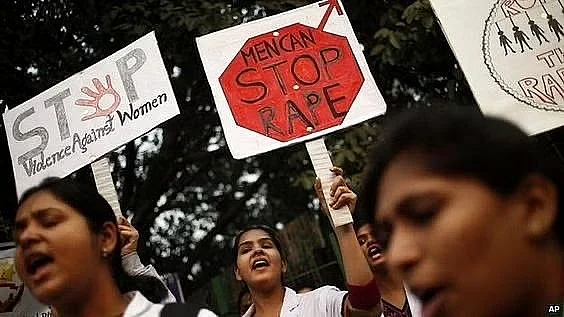Vedic Sanskrit text attributed the crossing of the seas as Samudrolangha that can cause the loss of Varna (social class). This proscription was based on the assumptions of contacting with sin or with the characterless, engaging with the mleccha (foreign or barbarous invaders) and with the inability to carry out the prescribed rituals of Hinduism.
Those travelling across the seas would be presumed to have broken ties with their familial, societal, and religious moorings (even deprived of water from the holy Ganga!) – they were assumed to have joined the immoral reprobates, naastiks (non-believers) and left for the proverbial Kala Pani (Black Water).
During the British Raj, the penal settlement on the distant Andaman and Nicobar Islands (1200 kms away from the Indian mainland), earned the new-age infamy of the veritable Kala Pani, with the irreparable shame of getting ‘Kala Pani ki sazza’ (banishment to Kala Pani) as the ultimate form of punishment, pain and diminishment afforded on an ostensible convict.
The brutality of existence for the prisoners incarcerated in the Cellular Jair at Port Blair would have justified its notoriety as Kala Pani, however the fact that many of them were freedom fighters ought to make the same land sacred and holy in the national imagination, post-independence.
The Bridging Gap Between Islanders and Mainlanders
Unfortunately, the assumed hyphenation or equivalence of the term Kala Pani and Andaman and Nicobar Islands has survived time and circumstances, that be – it is a despicable slur and curse onto the proud inhabitants of this ‘shining outpost’ of India that has contributed immeasurably to the Indian freedom struggle.
It was to this fount of incorrect nomenclature that I had the honour to serve in these Emerald Islands for over six years. It was here and then, that I realised the enormity of the emotive ‘distance’ between the ‘Islanders’ and the so-called ‘Mainlanders’.
Unbeknownst to many, these distant Islands are the finest personification of the inclusive, accommodative, and large-hearted ‘Idea of India’ as sought by the noble and lofty Constitution of India and its founding fathers.
A quaint dialect of Hindustani binds an unmatched diversity of Punjabi, Malayali, Maharashtrian, Tamil, Bengali, Jharkhandi or even a Purvanchali happily sinking their regional/ethnic/religious differences and uniting compositely and simplistically as ‘Islanders’.
However, the underlying equation with the so-called ‘Mainlanders’ remained uneasily distrustful, complicated, and sometimes even spiteful. A ‘us-versus-them’ relationship dominated the narrative, with the premise of ‘Mainlanders’ ruling and defining the destiny of the vulnerable ‘Islanders’. Many efforts to assuage the sensibilities and bridge the disconnect were made.
The essential face of the ‘Mainlanders’, barring the sprinkling of tourists (a welcome infusion given the relevance of tourism in the economic health of the Islands) was the bulk of senior administrative staff who oversaw the administration of the Andaman and Nicobar Islands.
Like all arms of governance that are given to varied experiences, the ‘Administration’ too had many who were recognised for their sincerity, honesty and dedication towards the Islands, and many more, who clearly weren’t.
As a former combatant who had served in the most far-flung parts of the country, one understood the subtle nuances and reasons for the societal ‘distance’ from the proverbial Delhi – but it was a sensitive and recuring task of mend and heal for the ‘Administration’ to win over its wary citizenry.
Over the years, many in the administrative staff did win the necessary trust of the locals with aplomb, and many failed in their duty of earnestness, leading to a perpetual concern amongst the ‘Islanders’.
Sex-for-Jobs Case
An extreme personification of this equation is the recent accusation in the sex-for-jobs/rape case attributed onto a senior and now-suspended official of the Andaman and Nicobar Administration.
The Calcutta High Court has directed the said official to appear before the Special Investigation Team (SIT) and the matter is sub judice.
It is important to let the law take its course with the necessary rigour and diligence, as also to refrain from commenting or opining specifically on the individuals concerned, without contributing anything new that is already there in the complaint sheets and public space.
To put it mildly, it is unprecedented in its significance for both the ‘Islanders’ and the accused officials (not the entirety of the ‘Administration’) for its implied wounds and future ramifications.
As the author had never worked with the accused officials (even though he is believed to have had an earlier stint in the Islands in the early 90’s), one would rather focus on conditions that often leads and breeds hubris, disinterest and even misuse of officialdom, in these distant Islands.
It is an undeniable fact that postings to places like Andaman and Nicobar are frequently considered ‘punishment postings’ within the AGMUT (Union Territory/Mizoram/Goa/Delhi) cadre, from which the senior staff of the local ‘Administration’ is empaneled.
This can sometimes lead to disgruntled, ‘parked’ or even vengeful attitude by some. In my personal experience the odd case of official seeking repatriation to ‘Mainland’, resorting to ‘time serving’ tactics or simply ‘not reporting to duty’ was not unheard of. It had to be dealt with individually.
Conversely, the physical distance from the metaphorical ‘Delhi’ could lend itself to a false sense of entitlement and power, for the unhinged – thankfully not many were like that.
However, given the disproportionate reliance on the officialdom for the day-to-day sustenance of the Islanders onto the local ‘administration’ (owing to the limited private opportunities/investments, protected forest areas and overarching reliance on government services), made the local ‘Administration’ even more intrusive and powerful as compared to their peers in the rest of the country.
Often the local voice of discontent wouldn’t reach the intended quarters and the local politicos further reaped the simmering animus towards even more polarisation, divides and distrust. The twain between the ‘Mainlanders’ and ‘Islanders’ remained fundamentally unmet. The curse of Kala Pani for both sides of the created ‘divide’, literally survived.
The Truth Must Prevail
The postured ‘banishment’ of two governmental officials (married couple) accused of misuse of their position (walking the dogs in a stadium) from Delhi to the frozen swathes of Ladakh, was symptomatic of the lazy narrative in the corridors of power that positions and presents a posting to Ladakh, Andaman and Nicobar Islands or Northeastern States as equivalent to ‘punishments’.
Not only is it a terrible affront to the locals in these far-flung areas but also to those in other services like the Armed Forces who could routinely serve a substantial part of their service in such areas, with much pride, purpose and dedication.
Incidentally earlier in his career the recently accused official in the latest sex-for-jobs case had gone to the tribunal after having done two prior postings, which were described as ‘hard posting areas’ (read, Andaman and Nicobar Islands and Arunachal Pradesh) and therefore on getting posted to Puducherry, thought it worthy of contesting in the Central Administrative Tribunal! No such objection is believed to have been raised when he was later posted to the coveted and all-powerful post of the Chief Secretary of the Andaman and Nicobar Islands.
There is much introspection due from the official mandarins in Delhi and the uncharitable allusions that they invariably make when posting officers to these border states, by the larger citizenry who casually and regrettably still insist on still calling the same Kala Pani and onto all those in society who can bridge this divide between the so-called ‘Islanders’ and ‘Mainlanders’.
The truth must prevail in this case as the accusations are incalculably serious and require immediate correction, from whichever side is found guilty of shameful acts.
To suggest that there is no latent issue (even before this case) or genuine reasons for the mistrust of the officialdom would be tantamount to harbouring the ostrich syndrome.
The Andaman and Nicobar is not only strategically placed and invaluable for the future of the country – it is arguably the land of freedom fighters, protected native tribes and settlers who have given their all to uphold the tricolour ramrod straight, even 1200 kms from the mainland of India.
Befittingly, it was also the place where the tricolour was first unfurled by Subash Chandra Bose in 1943 (declaring the Islands to be freed from British rule, albeit with the Japanese forces and Indian National Army contingent). Surely this region is not Kala Pani but Pavitra Pani (Holy Water), and it deserves much better than the shame that it is mired in with this accusation.
(The author is a Former Lt Governor of Andaman & Nicobar Islands and Puducherry. This is an opinion piece and the views expressed above are the author’s own. The Quint neither endorses nor is responsible for the same.)
(At The Quint, we question everything. Play an active role in shaping our journalism by becoming a member today.)



